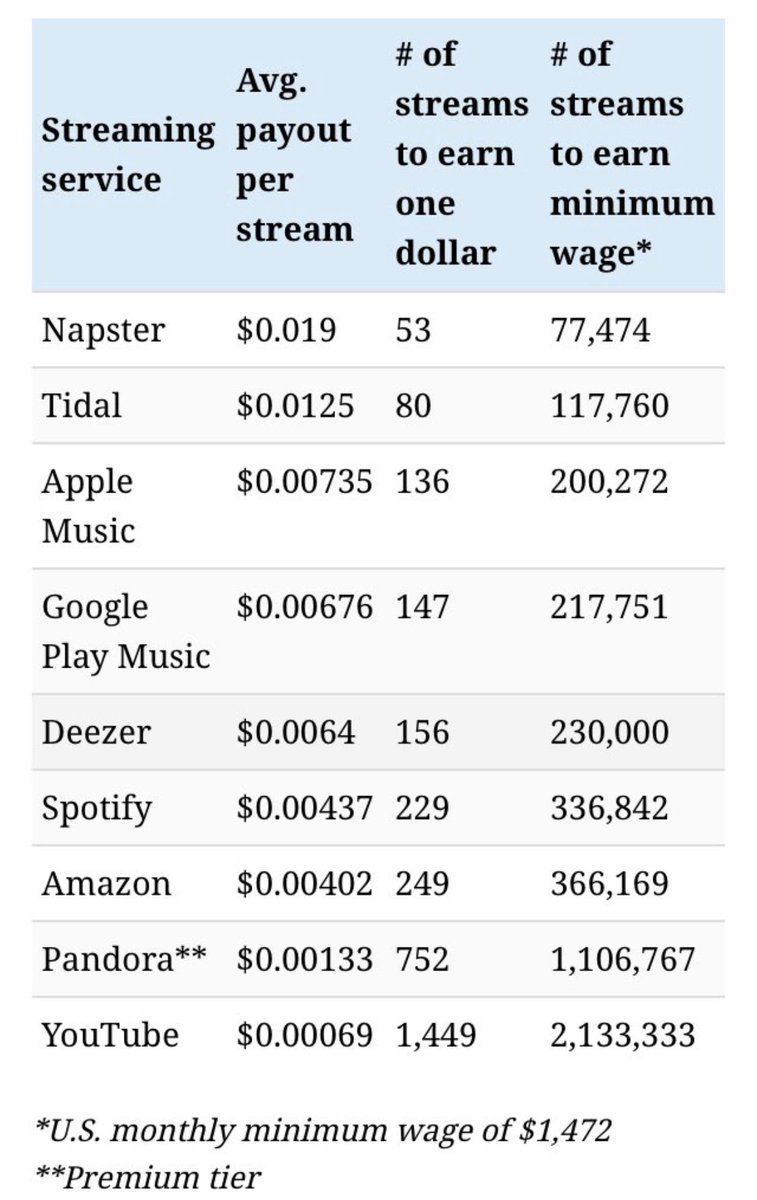Why the music industry HAS to change and why it has to change now. A thread. Stick with it!
I hope it’s not wrong of me to assume that most people don’t know or fully understand how musicians get paid. Truth is, I know an awful lot of musicians that don’t understand how they get paid.
We can’t expect our legislators or, more importantly, consumers to demand change on our behalves when it is such an annoyingly complex picture. However, everything is getting desperately clear.
The ways in which we make money are disappearing and the inequities of the recorded music business are being severely exposed. First of all, let’s consider touring as a means of income, well it’s gone. Done. Nada.
The next way artists, players and songwriters are rewarded is through a ‘Performance Royalty’ for writing and something else called ‘Equitable Remuneration’ for performance. That they appear to have the wrong names is one of the many ways in which this problem can prove obscure.
These royalties originate from licenses for your work to be played in public. TV stations, pubs, clubs, hairdressers and music venues in the UK will be very familiar with paying these licenses.
So what is about to happen? Businesses, shops etc will not be able to pay for those licenses in increasing numbers. Commercial TV stations will see their advertising revenues fall and ask to pay less for their broader performance licenses.
And with the collapse of touring, and the music venues not paying, the artists and writers will be doubly hit by the disappearance of the related royalties.
Which leaves the only remaining constant way that we get paid at all. The recorded music business. You’d imagine that what most people think of as ‘the music business’ would pay musicians right?
Well it turns out that if you subtract the other ways in which we’ve sought to pay rent, there really isn’t a lot of people making much money at all from a business that generates 10s of Billions in profits for the people who built the system.
Here are the money splits from streaming: Streaming company keeps 30%. The Recording gets 57%, the Song gets 13% (of which publishers get half). So that’s 6.5% that goes to the writers of which, on any song, there may be multiple.
What an artist earns from that 57% varies enormously. A few self-releasing and successful artists do very well out of this situation. But most artists labouring under Major Label contracts are unlikely to make as much as 50% of it. 20% in most cases.
When you consider how little the money earns from each stream (approx £0.005 per play), you need a lot of plays and any kind of money. We do not get a fair cut.
How did we get here? The recording industry used to have massive overheads. Shipping, packing, manufacture, marketing, distribution. These costs are still built in even though they do not objectively exist.
In fact, many labels still pay to artists based on 90% earnings because they hold back 10% for ‘breakages’ (when they used to pack vans with vinyl and there were inevitable casualties).
The other big question here is ‘what is streaming?’ The record business claims that it is reproduction and so all the money goes to them, but, even to the idle observer, much of what streaming does looks a lot more like broadcasting.
When your streaming service picks a song for you do you feel like you made a purchase or like you’re listening to the radio?
If accept the broadcast model for 50% of the streaming business, they would pay licenses and we’d get paid through performance royalties (both types described). The money would come straight through to artists/players/writers and not go through the (often vague) books of labels.
Getting to a place where the recording business pays fairly has to be in the interests of everyone involved. Maybe not the shareholders of Major Labels, but just about every single other individual in our profession.
It would begin to rebuild the lost middle class of the music industry and establish a healthy system that could weather these kinds of calamities.
We need to start the pressure now. We need to move on this. It’s not crass, it’s about survival and justice in an industry that has been able to play fast and loose for far too long with the talents of others for extraordinary profits.
@bpi_music
@JWhittingdale
@JoStevensLabour
@TracyBrabin
@julianknight15
@tom_watson
@KevinBrennanMP
@MCPS
@PRSforMusic
@helienne
@AppleMusic
@Spotify
@IvorsAcademy
@crispinhunt
@WeAreTheMU
@UK_Music
@SteveMasonKBT
@thomyorke
@Tim_Burgess
@JWhittingdale
@JoStevensLabour
@TracyBrabin
@julianknight15
@tom_watson
@KevinBrennanMP
@MCPS
@PRSforMusic
@helienne
@AppleMusic
@Spotify
@IvorsAcademy
@crispinhunt
@WeAreTheMU
@UK_Music
@SteveMasonKBT
@thomyorke
@Tim_Burgess
It’s a #brokenrecord business.
Correction: I flippantly say publishers take half. Most new deals give writers 80/20 in their favour, but 50 years ago it was 50/50. Across catalogue and including sub-publishers I cannot estimate what % publishers extract but this detail is wrong. New Writers ought to get 10%.
But, yeah, that is 10% of £0.005.
Which is £0.0005.
Which is £0.0005.
Please put "I& #39;m a #BrokenRecord" in your bio if you want to see equity in streaming, or tweet about the #BrokenRecord business. How else can musicians get through this calamity?

 Read on Twitter
Read on Twitter


